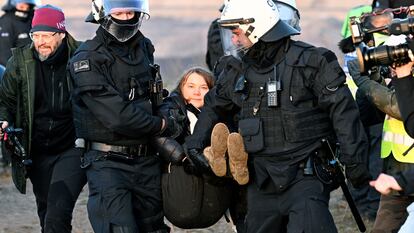Greta Thunberg carried away by police at German mine protest
The German government reached a deal with energy company RWE last year allowing it to destroy a village in return for ending coal use by 2030

Police in western Germany carried Swedish climate activist Greta Thunberg and other protesters away Tuesday from the edge of an open coal pit mine where they demonstrated against the ongoing destruction of a village to make way for the mine’s expansion, German news agency DPA reported.
Thunberg was among hundreds of people who resumed anti-mining protests at multiple locations in the western German state of North Rhine-Westphalia a day after the last two climate activists holed up in a tunnel beneath the village of Luetzerath left the site.
The German government reached a deal with energy company RWE last year allowing it to destroy the village in return for ending coal use by 2030, rather than 2038. Both argue the coal is needed to ensure Germany’s energy security that’s squeezed by the cut in supply of Russian gas due to the war in Ukraine.
But environmentalists say bulldozing Luetzerath will result in vast greenhouse gas emissions. Germany is expected to miss its ambitious climate targets for the second year in a row.
Amid the heated coal debate in Germany, the European Union pushed forward on Tuesday with a major clean tech industrial project designed to boost its plans for a greener future as the 27-nation bloc pursues the goal of being climate neutral by 2050.
Elsewhere in western Germany, dozens of climate activists glued themselves to a main street in Germany’s western city of Cologne and to a state government building in Duesseldorf. Near Rommerskirchen, a group of about 120 activists also occupied the coal railroad tracks to the Neurath power plant, according to police and RWE.
Those who refused to leave the tracks were carried away, dpa reported.
In addition, several people occupied a giant digger at the coal mine of Inden, while hundreds of other protesters joined a march near Luetzerath. The village itself was evacuated by the police in recent days and is sealed off.
Once again, there were a few clashes with the police.
Several activists ran over to the Garzweiler open pit mine, according to dpa. They stood at the brink of the open pit, which has a sharp break-off edge. Police said it was dangerous and people were prohibited from staying there.
Thunberg had traveled to western Germany to participate in weekend demonstrations against the expanded mine and also took part in Tuesday’s protest near Luetzerath. Police in nearby Aachen said a group of around 50 protesters got dangerously close to the rim of the mine and did not want to leave despite being asked to do so.
All the people in that group had to be carried away from the edge of the mine and were then temporarily held to determine their identities, police said. Photos from the scene showed Thunberg was one of those whom officers took away.
One protester was able to enter the mine, RWE said, calling the move “very reckless,” dpa said.
A police spokesman, who spoke on condition of anonymity as is customary in Germany, said he was not permitted to give out any details on Thunberg or any other individuals who participated in the protest due to privacy rules.
Police and RWE started evicting protesters from Luetzerath on Jan. 11, removing roadblocks, chopping down treehouses and bulldozing buildings.
Activists have cited the symbolic importance of Luetzerath for years, and thousands of people demonstrated Saturday against the razing of the village by RWE for the expansion of the Garzweiler coal mine.
Sign up for our weekly newsletter to get more English-language news coverage from EL PAÍS USA Edition
Tu suscripción se está usando en otro dispositivo
¿Quieres añadir otro usuario a tu suscripción?
Si continúas leyendo en este dispositivo, no se podrá leer en el otro.
FlechaTu suscripción se está usando en otro dispositivo y solo puedes acceder a EL PAÍS desde un dispositivo a la vez.
Si quieres compartir tu cuenta, cambia tu suscripción a la modalidad Premium, así podrás añadir otro usuario. Cada uno accederá con su propia cuenta de email, lo que os permitirá personalizar vuestra experiencia en EL PAÍS.
¿Tienes una suscripción de empresa? Accede aquí para contratar más cuentas.
En el caso de no saber quién está usando tu cuenta, te recomendamos cambiar tu contraseña aquí.
Si decides continuar compartiendo tu cuenta, este mensaje se mostrará en tu dispositivo y en el de la otra persona que está usando tu cuenta de forma indefinida, afectando a tu experiencia de lectura. Puedes consultar aquí los términos y condiciones de la suscripción digital.








































